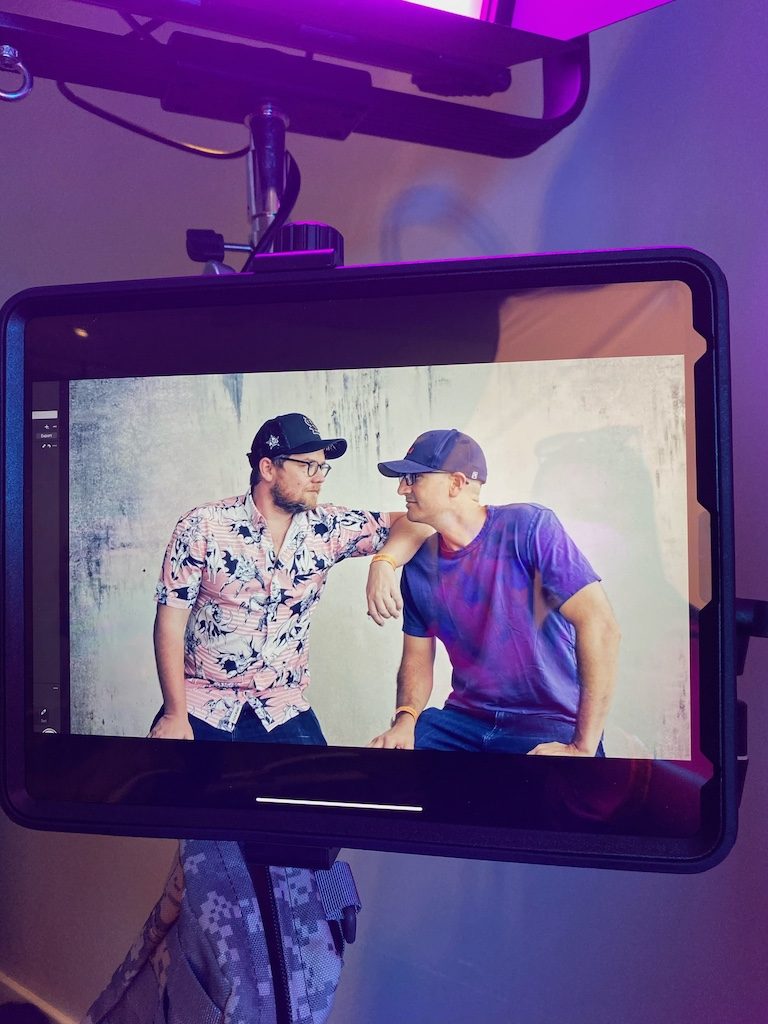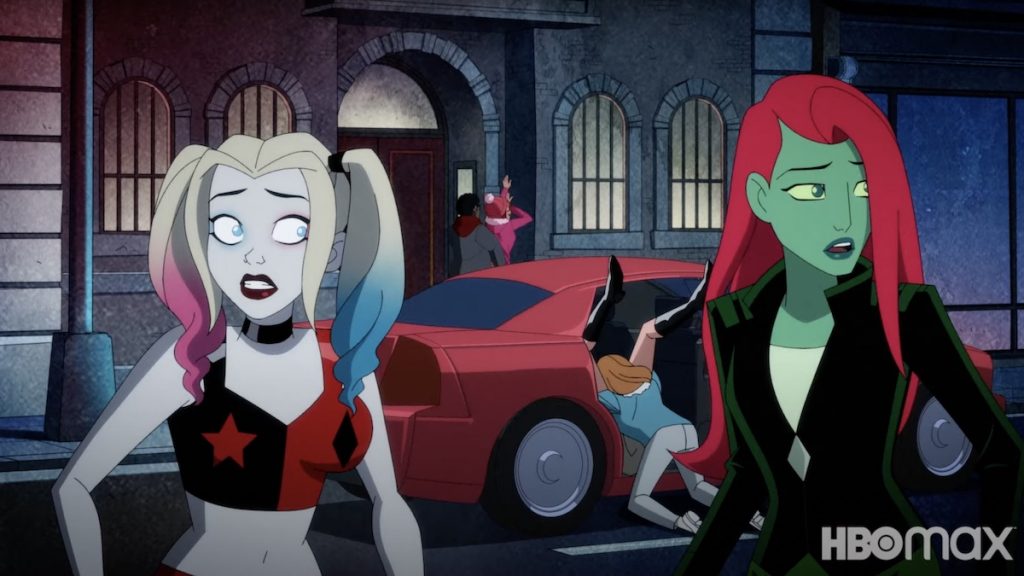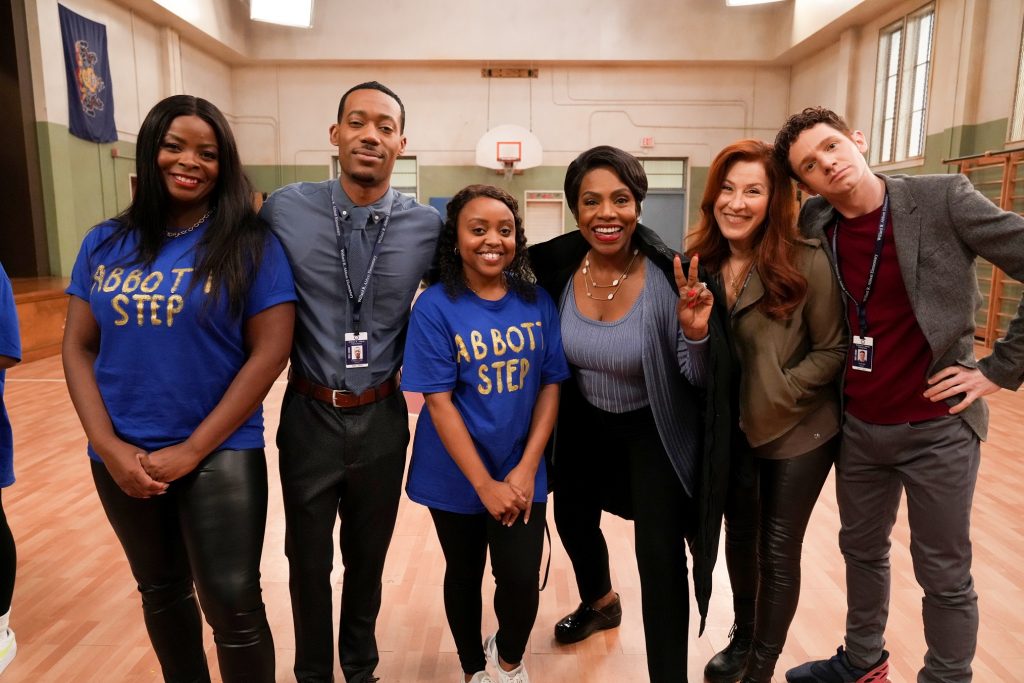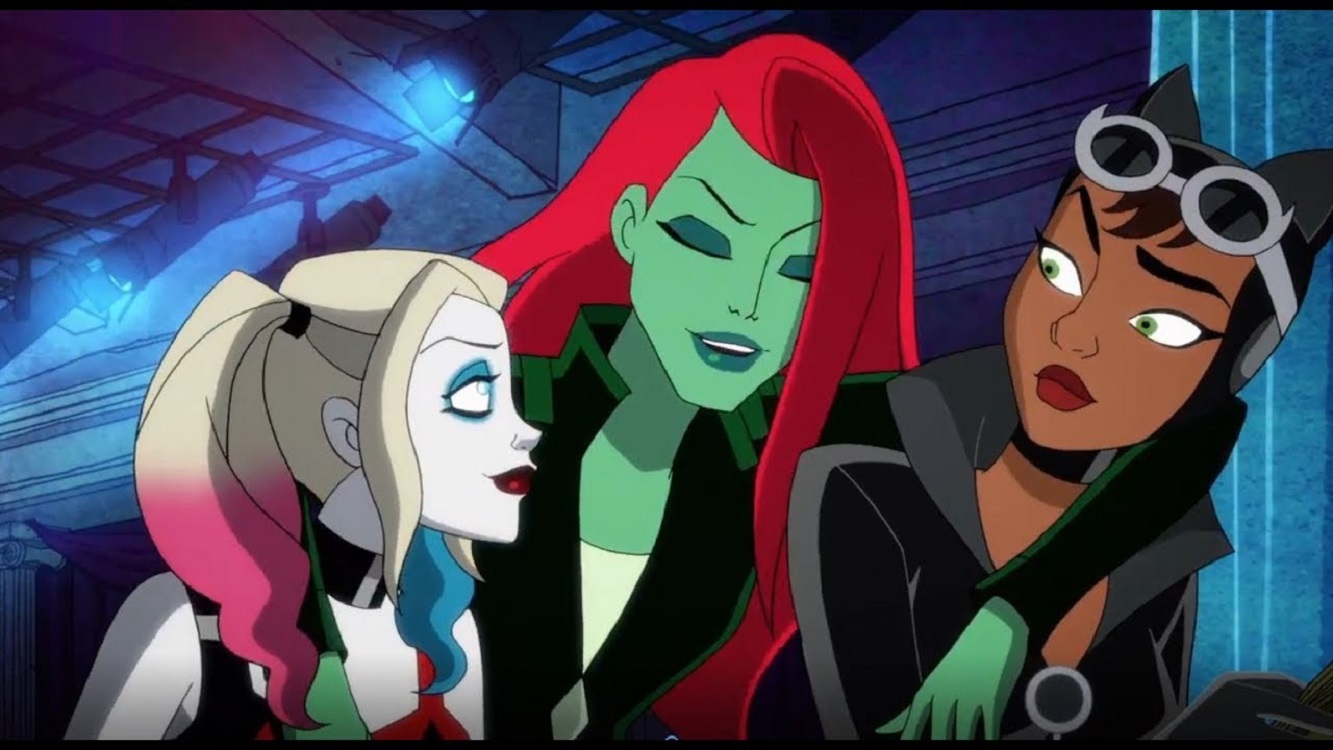“We were interns together at A Band Apart Productions, which was Quentin Tarantino’s production company,” says Justin Halpern, about his partnership with Patrick Schumacker. “We worked in commercials and music videos, but we never saw Quentin, ever. Ever.”
Back then, Halpern wanted to be a screenwriter and Schumacker wanted to be a commercial and music video director. “I always enjoyed writing, but I think I was more passionate about communicating through visuals, and words being secondary. That’s perhaps too reductive, but I think that’s why we make a good pairing.”
As writing partners, the duo have credits on $#*! My Dad Says, Cougar Town, iZombie, Harley Quinn, and Abbott Elementary. “I come at ideas from a visual or aesthetic place and Justin comes at them from more of a character or psychological place. It works for us.”
“We started out feeling like we both had to do the exact same job. We wrote stuff together. We directed together, on the side, when we still had day jobs. But when we got our own show on the air, we felt like we needed to be this two-headed entity performing the same tasks. But now, we’ve developed a system to divide and conquer.”
Halpern spends the bulk of his time in the writer’s room focusing on story breaking. Schumacker floats between the writer’s room and set to oversee the filming process.
$#*! My Dad Says
The writers’ first show came from a Twitter feed. Halpern started ShitMyDadSays to keep a log of outrageous quotes from his father. “It blew up and suddenly, Pat and I were getting incoming calls, which is something you want, but never get in Hollywood.”
The quotes were things like… “The worst thing you can be is a liar. . . . Okay, fine, yes, the worst thing you can be is a Nazi, but then number two is liar. Nazi one, liar two.” Everyone wanted to turn the famous feed into something more.
Halpern and Schumacker agreed, “The only thing we want to make sure of is that it doesn’t end up being a multicam sitcom on CBS. And that is exactly what it ended up becoming.” They walked into pitch meetings aiming to make a single cam on HBO, but because they “didn’t know anything,” they eventually agreed to do whatever they needed to do to get the show made.
“It wasn’t a situation where, ‘If only we had gotten our way, it would have been a good show.’ No, it would have been a bad one no matter what,” the writers joke. The 2010 show starred William Shatner as the father, Dr. Edison Milford Goodson III and Jonathan Sadowski as the son, Henry Goodson.

Patrick Schumacker and Justin Halpern
Their writing process back then was to work in a room together, talk out all the dialogue, and rotate who typed on the computer. “Now, we’ve been writing partners for twenty years, and we’re so familiar with each others’ writing and so familiar with what the other one wants, we can break off scenes, take a crack at them, then bring them together and go through them together.”
This is how they did the Harley Quinn Valentine Special, as an example, which they wrote with co-creator Dean Lorey (Arrested Development, Major Payne).
Harley Quinn’s Valentine’s Day
In Harley Quinn: A Very Problematic Valentine’s Day Special, the three writers outlined the scenes they wanted to include and then “Frankensteined” the various scenes together. “It was a six act story. We each took two acts and “Frankensteined” them together. We were so simpatico that, even though we expected it to be a disaster, it actually connected. We’ve become a hive mind.”
“When we’re starting a pilot or spec script from scratch,” says Halpern, “we do write the start of it together because we need to be on the same page with how the characters talk, how they interact with one another. We need to see each other realize it in real time. Then, once we have a sense of it, we can break off.”
The writers went on to say if an idea is all high concept in plot and not born from character, you may not have enough there to sustain a full movie or a full season of television. “If character decisions aren’t driving the story forward, it just becomes a sketch.”
That said, you can always go deeper. The writers mentioned Swiss Army Man and Everything Everywhere All at Once. “You look at the poster for Swiss Army Man and it seems like this Gonzo, cool, funny idea, but those guys find a way to get some grounded emotion into it. That’s something we try to do now. We care less about titillation for titillation’s sake. But don’t get me wrong, we love a good fart joke.”
“When you’re pitching a show, you do have to find a personal access point. People want to know why you like the show. If you don’t like it, why would they like it? So we talk about what we love about a theme or idea. We sort of have that lead us into our idea or pitch. What’s the idea or theme? Then we explore.”

Harley Quinn (Kaley Cuoco) & Poison Ivy (Lake Bell) Photo courtesy of HBO Max.
“I think there’s a misconception that you go in there and start talking about your show. I’m sure there are people who can do that successfully, but for us, it’s about the idea we want to explore. You lean into a personal anecdote. Quinta Brunson talked about an emotionally charged scene of her mother working a parent-teacher night for Abbott Elementary. For Harley, it was about toxic relationships, breaking up, and being out of that fog [from dating the Joker].”
Balancing Multiple Shows
“We’re always multitasking. This business is of failure. Most things you come up with — scripts, pilots — they’re just never going to see the light of day. It becomes a numbers game.”
Mathematically, the writers say if they have five projects in development, the odds are better than simply working on a single project. “Then, sometimes, what you have to make sure not to do is shotgun shit out there and try to make something stick. They need to be projects that you love and want to see.”
Halpern says there were points when they were just writing with the studios in mind, but it wasn’t something they would actually want to watch. “I went into a dark place because I hated everything we were working on. I didn’t want to watch any of it.”
In 2016 the writers decided to only work on projects they truly wanted to watch. This line in the sand completely turned their careers around. “Part of it is a function of maturity too. Prior to 3-4 years ago, we were prone to complete self-doubt and imposter syndrome where you get to a point where you think nothing works. I think now, we sense those moments coming, but there’s a way to make it better and keep stoic in those moments.”
The other solution is working with a support system. “There are talented people we trust who we have a shorthand with. Abbott Season 1 and 2 coincided with Harley Quinn’s writing and production process, so we were able to promote a writer from within — Sarah Peters (Ghosted, Master of None) — to be the day to day showrunner on Harley.”
With Peters’ help, they were able to “relinquish control and be okay with it.” The goal, when handing off the work, according to the writers and advice from friend Phil Lord (Spider-Man: Into the Spider-Verse, Clone High) is “to find writers where you want to see their version [of the show].”
Different Styles of Comedy
If you watch Abbott Elementary and Harley Quinn, it’s not likely you’d assume the same writers work on both shows. Beyond live action versus animation, the comedy is simply different. Abbott Elementary is somewhat dry and sweet where Harley Quinn is outrageous and wild.
Read our interview with Brittani Nichols on writing Abbott Elementary here.
“I do think there’s a little serendipity in the way it came to be. Now, the market might be open to us doing eclectic things because Harley came first. Harley landed in our laps, to do this R-rated Harley Quinn show. It’s an amazing opportunity and it was the best thing we worked on. It was the most ‘us.’”
Simultaneously, they were working on a light genre pilot for CW and this led to a docustyle idea to create what later became Abbott Elementary, but it would have been animated. Another year later, they ran into Quinta Brunson again and both parties had been thinking about Abbott as a live action show. “Two weeks later, we were pitching to the studios.”

Cast Of Abbott Elementary. Photo by ABC/ Scott Everett White
“That was the serendipity part. There was this person, Quinta, who had this really great, unbelievable story about her mother and her relationship with her who was an educator for forty years. And, we just wanted to do this with her.”
In many ways, Abbott Elementary and Harley Quinn are nothing alike, but underneath the surface, the writers say they’re both underdog stories. “There’s a sliver of overlap, but for the most part, it scratches two different itches in my brain. They’re both about discovery and figuring out your place in the world.”
“Janine is constantly trying to figure out how do I do good in this world? What does success look like? And Harley is trying to figure out, where do I exist in this world? I’ve always been this guy’s girlfriend, but how do I exist in this world?”
Advancing to Showrunner
The screenwriters both believe every writer who wants to be a showrunner should almost be required to take a business management class, as the job changes so drastically once you’re promoted from staff writer to showrunner.
“It’s like you get successful enough that you are now the writer and the manager of a TJ Maxx. You’re like, ‘Wait, I’m just a writer.’ And they say, ‘Yeah, but now you have to oversee ‘Men’s Wear,’’ and that’s a completely different skillset,” the writers joke. “There’s just so much basic management stuff you have to do.”
With Harley Quinn, the writers say they basically got to do everything they wanted to do. “Bless DC and Warner Brothers, they really were like, ‘Go make the show you want to make’ and you don’t get that a lot. The fact that Harley exists is a testament to that company saying, ‘Make what you want to make.’”
Going into this show, conceptually, they wanted to do a workplace, ensemble comedy. “We always pitched it as ‘Mary Tyler Moore if she were a murderous psychopath.’ It was also this two-hander of Harley and Ivy, so there’s a breakup story to begin with, but in the back of our heads, we had this incredible opportunity to get Harley and Ivy together.”
The studio was excited about the Mary Tyler Moore psychopath idea to get the ball rolling. “Season 2 became this deviation into Harley and Ivy’s romance. That became the focus of the show.” In the Valentine’s episode, for example, the plot reads, “Harley and Ivy are celebrating their very first Valentine’s Day together. Also follows the rest of the ragtag crew and how they spend the gushiest, mushiest, most romantic day of the year.”
“We got some pushback at first. Are we being too irreverent about this IP, which is a funny note, but we tested the animatics for a couple of episodes — one that was particularly hard on Commissioner Gordon being an alcoholic — but we tested it in front of some self-described super fans and they loved it. Then they never gave us another note after that.”
This interview has been condensed. Listen to the full audio version here.

